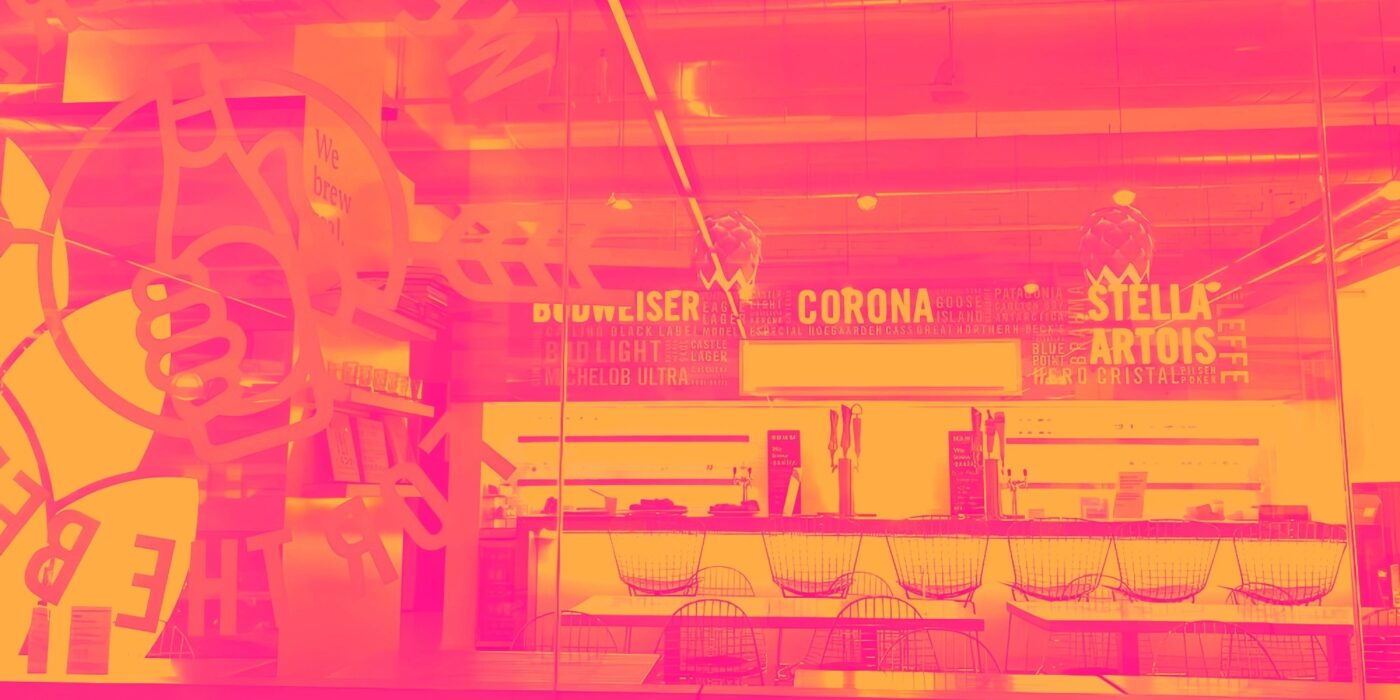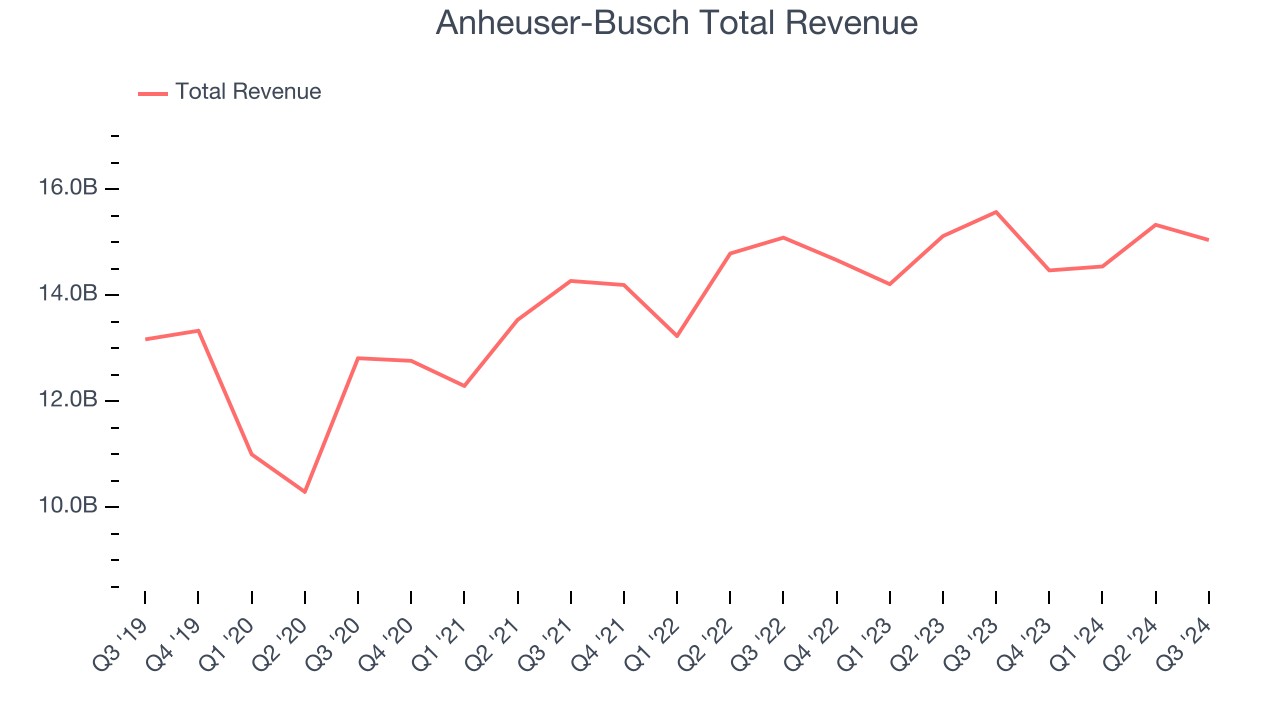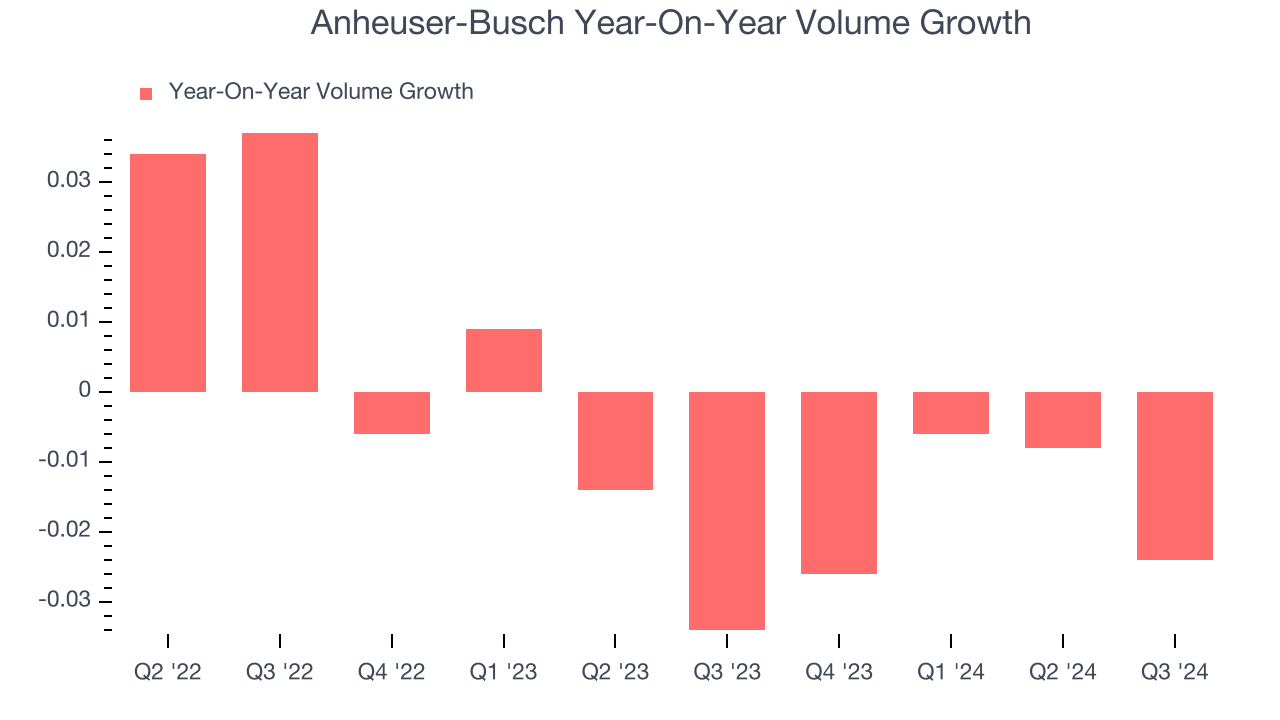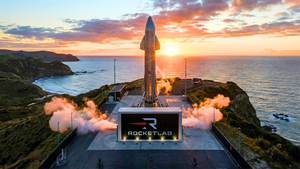
Beer powerhouse Anheuser-Busch InBev (NYSE: BUD) missed Wall Street’s revenue expectations in Q3 CY2024, with sales falling 3.4% year on year to $15.05 billion. Its non-GAAP profit of $0.98 per share was 7.5% above analysts’ consensus estimates.
Is now the time to buy Anheuser-Busch? Find out by accessing our full research report, it’s free.
Anheuser-Busch (BUD) Q3 CY2024 Highlights:
- Revenue: $15.05 billion vs analyst estimates of $15.71 billion (4.2% miss)
- EBITDA: $5.42 billion vs analyst estimates of $5.68 billion (4.5% miss)
- Adjusted EPS: $0.98 vs analyst estimates of $0.91 (7.5% beat)
- Gross Margin (GAAP): 55.6%, up from 53.9% in the same quarter last year
- Operating Margin: 27.2%, up from 25.7% in the same quarter last year
- EBITDA Margin: 36%, up from 25.9% in the same quarter last year
- Organic Revenue rose 2.1% year on year (5% in the same quarter last year)
- Sales Volumes fell 2.4% year on year (-3.4% in the same quarter last year)
- Market Capitalization: $115.1 billion
“Beer is a passion point for consumers. Consumer demand for our megabrands and the execution of our mega platforms delivered another quarter of top- and bottom-line growth with margin expansion. Our teams and partners continue to execute our strategy and we are confident in our ability to deliver on our raised FY24 EBITDA growth outlook of 6-8%.” – Michel Doukeris, CEO, AB InBev
Company Overview
Born out of a complicated web of mergers and acquisitions, Anheuser-Busch InBev (NYSE: BUD) boasts a powerhouse beer portfolio of Budweiser, Stella Artois, Corona, and local favorites around the world.
Beverages, Alcohol and Tobacco
These companies' performance is influenced by brand strength, marketing strategies, and shifts in consumer preferences. Changing consumption patterns are particularly relevant and can be seen in the rise of cannabis, craft beer, and vaping or the steady decline of soda and cigarettes. Companies that spend on innovation to meet consumers where they are with regards to trends can reap huge demand benefits while those who ignore trends can see stagnant volumes. Finally, with the advent of the social media, the cost of starting a brand from scratch is much lower, meaning that new entrants can chip away at the market shares of established players.
Sales Growth
A company’s long-term performance can indicate its business quality. Any business can put up a good quarter or two, but many enduring ones grow for years.
Anheuser-Busch is one of the most widely recognized consumer staples companies. Its influence over consumers gives it negotiating leverage with distributors, enabling it to pick and choose where it sells its products (a luxury many don’t have). However, its scale is a double-edged sword because it's harder to find incremental growth when you've already penetrated the market.
As you can see below, Anheuser-Busch’s 4% annualized revenue growth over the last three years was sluggish as consumers bought less of its products. We’ll explore what this means in the "Volume Growth" section.

This quarter, Anheuser-Busch missed Wall Street’s estimates and reported a rather uninspiring 3.4% year-on-year revenue decline, generating $15.05 billion of revenue.
We also like to judge companies based on their projected revenue growth, but not enough Wall Street analysts cover the company for it to have reliable consensus estimates.
Here at StockStory, we certainly understand the potential of thematic investing. Diverse winners from Microsoft (MSFT) to Alphabet (GOOG), Coca-Cola (KO) to Monster Beverage (MNST) could all have been identified as promising growth stories with a megatrend driving the growth. So, in that spirit, we’ve identified a relatively under-the-radar profitable growth stock benefitting from the rise of AI, available to you FREE via this link.
Volume Growth
Revenue growth can be broken down into changes in price and volume (the number of units sold). While both are important, volume is the lifeblood of a successful staples business as there’s a ceiling to what consumers will pay for everyday goods; they can always trade down to non-branded products if the branded versions are too expensive.
To analyze whether Anheuser-Busch generated its growth from changes in price or volume, we can compare its volume growth to its organic revenue growth, which excludes non-fundamental impacts on company financials like mergers and currency fluctuations.
Over the last two years, Anheuser-Busch’s average quarterly sales volumes have shrunk by 1.4%. This decrease isn’t ideal as the quantity demanded for consumer staples products is typically stable. Luckily, Anheuser-Busch was able to offset fewer customers purchasing its products by charging higher prices, enabling it to generate 6.2% average organic revenue growth. We hope the company can grow its volumes soon, however, as consistent price increases (on top of inflation) aren’t sustainable over the long term unless the business is really really special.

In Anheuser-Busch’s Q3 2024, sales volumes dropped 2.4% year on year. This result was a further deceleration from the 3.4% year-on-year decline it posted 12 months ago, showing the business is struggling to push its products.
Key Takeaways from Anheuser-Busch’s Q3 Results
It was encouraging to see Anheuser-Busch slightly top analysts’ EPS expectations this quarter. On the other hand, its revenue missed analysts’ expectations and its EBITDA fell short of Wall Street’s estimates. Overall, this quarter could have been better. The stock traded down 4.3% to $60.19 immediately after reporting.
Anheuser-Busch’s latest earnings report disappointed. One quarter doesn’t define a company’s quality, so let’s explore whether the stock is a buy at the current price. What happened in the latest quarter matters, but not as much as longer-term business quality and valuation, when deciding whether to invest in this stock. We cover that in our actionable full research report which you can read here, it’s free.





